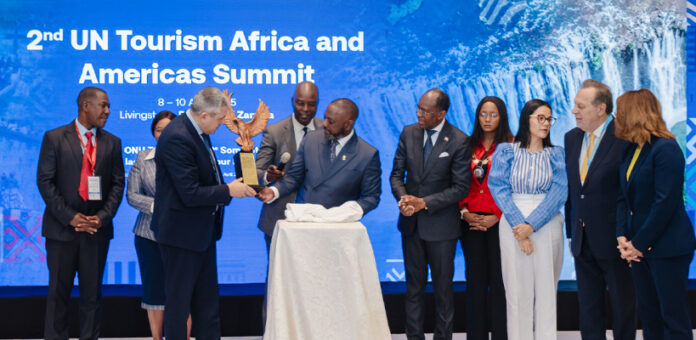UN Tourism has taken another major step towards advancing South-South cooperation in tourism development with the successful hosting of the 2nd UN Tourism Africa & The Americas Summit in Livingstone, Zambia.
Building on the foundation laid in Punta Cana last year, this year’s summit outlined concrete strategies to implement the Punta Cana Declaration, focusing on innovation, technical cooperation, connectivity, investment, and enhancing tourist confidence and safety.
Bringing together key leaders from Africa and the Americas, the summit reflected a growing movement of cross-continental unity. In his opening address, UN Tourism Secretary-General Zurab Pololikashvili described the event as “proof of the enduring commitment of Africa and the Americas to cooperate across borders and oceans.”
“Now, with recovery complete, we look to the future,” he told the packed room of ministers and tourism stakeholders. “Our theme today reflects our priorities. We must build a more resilient tourism sector — and do so through the key pillars of connectivity, investment, and workforce development.”
Strong recovery and new momentum
The Secretary-General celebrated the resilience of the tourism sector, citing UN Tourism’s latest data. In 2024, Africa welcomed 74 million international travellers, a 12% increase over 2023 and 7% more than in 2019. The Americas saw 213 million arrivals, representing 97% of pre-pandemic levels.
“Our latest data makes clear the huge potential of tourism – as well as its resilience,” Zurab noted. “This is a sector that not only survived the pandemic – it’s bouncing back stronger and more united.”
“Africa and the Americas are not just connected by history and culture – they are now connected by ambition, opportunity, and a shared vision for inclusive growth through tourism.”
Connectivity, Investment and Skills
Pololikashvili outlined three strategic pillars that will guide the next phase of South-South tourism development: improved connectivity, increased investment, and accelerated human capital development.
On connectivity, he said:“This is a proven way to build opportunities for economic and cultural exchange. We are committed to working with our Member States to boost connections within regions and between regions.”
On investment, he emphasised: “Between 2019 and 2023, Africa and the Americas welcomed over $40 billion in foreign direct investment across 520 greenfield projects, generating around 150,000 jobs. But there is massive room for further growth.”
“More than half of recent tourism investments now lean toward environmentally conscious projects, showing our shared drive for sustainability in line with the 2030 Agenda.”
On skills development, he stressed the importance of youth: “By focusing on training and skill-building, we’re giving our people, especially the youth, the means to succeed in today’s competitive world.”
He also praised the Travel Hospitality & Tourism Education Summit held in Lusaka the day before:
“It was striking that all stakeholders – from both the public and private sectors – agreed on the importance of human capital development. We are proud to support our Member States in making this happen.”
Real action on South-South cooperation
The Summit also showcased progress in implementing the Punta Cana Declaration, particularly in fostering tourism investment between regions. UN Tourism reported that between 2019 and 2024, Africa invested approximately USD 3.9 billion in 36 projects across the Americas, while Latin America and the Caribbean matched this with 34 projects in Africa.
To build on this, UN Tourism announced plans for a Biennial Africa-Americas Tourism Investment Conference, designed to connect public and private stakeholders, stimulate cross-border investment, and align capital with sustainability goals.
Innovation, education and future talent
A major theme was preparing for the future through education and innovation. Pololikashvili highlighted efforts such as the ZITHS Mukuni International Academy for Tourism and Hospitality in Livingstone and a forthcoming start-up competition called “Bridges of Innovation” to spotlight sustainable and inclusive tourism enterprises.
“Education, investment, and cultural exchange were the cornerstones of the Punta Cana Declaration. This Summit is our chance to build on those foundations—and build a tourism sector that works for everyone,” the Secretary-General said.
“We will make sure that tourism not only preserves our shared heritage but, more importantly, lifts living standards across borders.”
Additionally, UN Tourism aims to reach 2,000 beneficiaries through new WhatsApp-based professional development courses in both regions.
Enhancing connectivity and security
Addressing structural barriers to tourism, the summit spotlighted efforts to improve air connectivity through partnerships, such as the new work plan with INGUAT (Guatemala) and the upcoming 2nd Ministerial Conference on Tourism and Air Transport in Africa, to be held in Angola in July 2025.
Tourist safety was also a priority. The ongoing Safety of Destinations Initiative (SAFE-D) was discussed, designed to strengthen public-private collaboration, promote crisis preparedness, and build confidence in travel to both regions.
A shared roadmap forward
As the summit drew to a close, the message was clear: the Africa-Americas partnership in tourism is no longer aspirational – it is operational. Through joint strategies in education, innovation, investment, and connectivity, the two regions are laying down the pathways to a tourism sector that is not only resilient but also inclusive, sustainable, and future-ready.
“I’m extremely excited about our upcoming conversations,” Pololikashvili concluded. “Together, we are mapping out new pathways for sincere and authentic cooperation between Africa and the Americas.”










